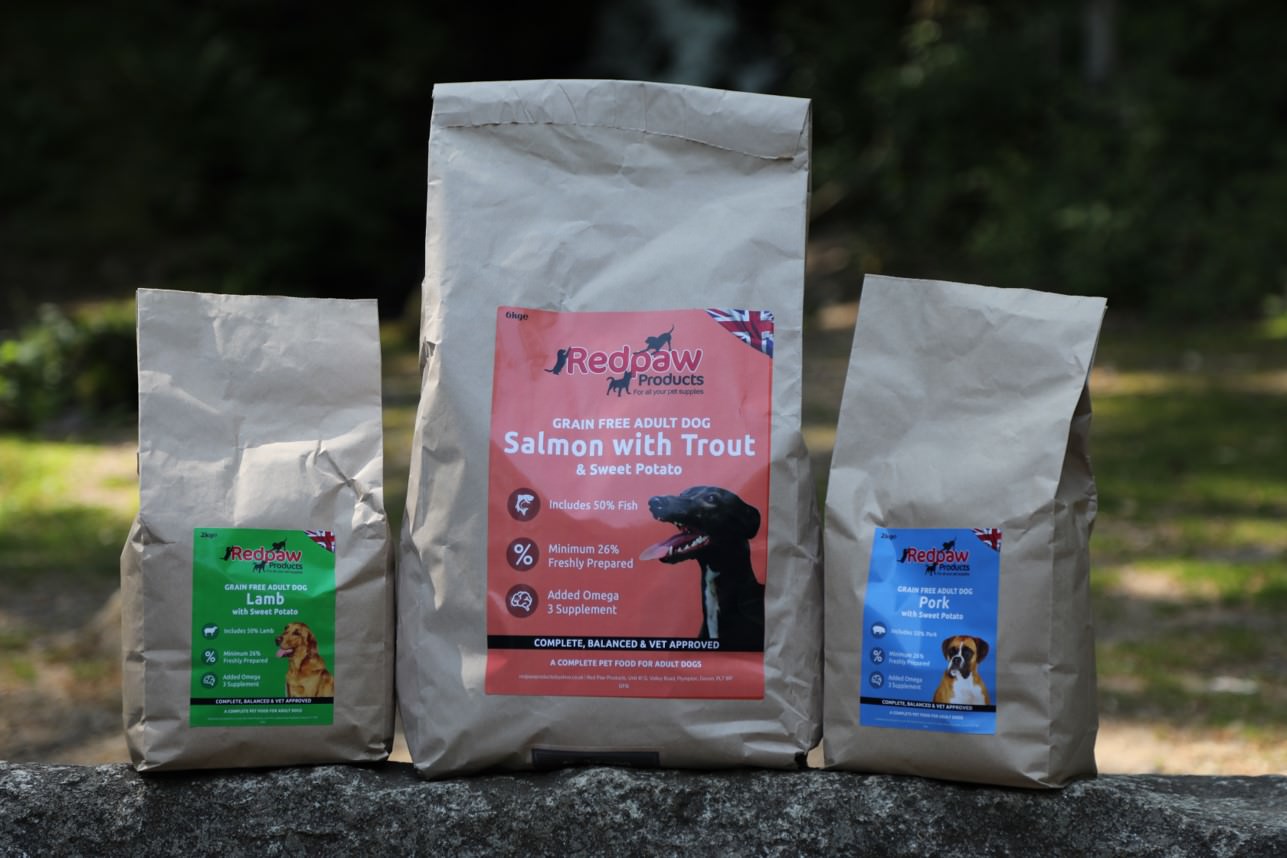Things to consider before buying dog food

Every dog is different and require a balanced diet that is unique to them: their breed, their life stage and taking into account and specific health problems.
For example, a senior dog has different needs to a puppy, and Great Dane will undoubted have different nutritional requirements to a pug.
To ensure your dog has an appropriate and healthy diet, there are six key nutrients to consider:
Vitamins
Vitamins are important for dogs because they play a crucial role in maintaining their overall health and well-being. Here are a number reasons why vitamins are essential for dogs:
- Nutritional balance: vitamins, along with other nutrients, help to maintain a balanced diet. They work alongside minerals, proteins, carbohydrates and fats to support proper growth and development.
- Immune system support: certain vitamins, such as vitamins C and E, have antioxidant properties to bolster the immune system. A strong immune system can help protect dogs from various diseases and infections.
- Energy production: B-complex vitamins, including thiamine, riboflavin, niacin and others, assist in converting food into energy. These vitamins play a crucial role in metabolism and help dogs maintain their optimal energy levels.
- Bone and joints: vitamins D and K are essential for maintaining strong bones and healthy joints. They assist in calcium absorption and promote proper bone development, particularly in growing puppies and senior dogs.
- Skin and coat: vitamins A, Biotin (B7) and E are important for maintaining healthy skin and coat. These vitamins support proper cell growth, prevent dryness, and help with hair regeneration.
- Eyes: vitamins A and vitamin C contribute to maintaining good vision and overall eye health. They help prevent conditions like cataracts and support the functioning of the retina.
While dogs may obtain many essential vitamins through a balanced diet, sometimes supplements can help during rapid growth, pregnancy, lactation, or when dogs have specific health conditions.
If you think that your dog may require some extra support, book in with our Canine Nutritionist to identify whether additional vitamins may help.
Palatants
Palatants play an essential role in a dog’s diet by helping make their food taste great. It is important to ensure palatants used in your pets food comes from natural sources.
Minerals
Minerals are essential for the overall health and well-being of dogs. They play a vital role in maintaining proper bodily functions and promoting optimal growth and development. This includes:
- Bone and teeth: minerals such as calcium, phosphorus, and magnesium are crucial for the development and maintenance of strong bones and teeth in dogs. They provide structural support and help prevent issues like fractures, osteoporosis and dental problems.
- Electrolyte balance: minerals such as sodium, potassium and chloride help maintain fluid balance. They are essential for nerve signalling, muscle function and hydration.
- Blood cell formation: minerals such as iron, copper and zinc are necessary for the formation of red blood cells. These carry oxygen throughout the body, ensuring proper oxygenation of tissues and organs.
- Enzyme function: many minerals act as cofactors for various enzyme reactions. They are essential for metabolism, digestion and overall cellular function.
- Immune system support: minerals like selenium and zinc play a vital role in supporting the immune system. They help in the production of antibodies and regulate immune responses to protect against illness and disease.
Overall, a balanced diet that includes appropriate amounts of essential minerals is crucial for maintaining optimal health and supporting various physiological functions in dogs.
Fat
Fat is fantastic energy source and enhances the absorption of fat-soluble vitamins and essential fatty acids such as Omega 3 and 6. These essential nutrients help dogs maintain healthy skin and coat and support the immune system whilst also aiding in development of healthy joints, brain and vision.
Protein
Protein and amino acids are building blocks, responsible for forming new skin cells, growing hair, building muscle tissue and much more. Protein sources also produce enzymes, hormones and antibodies. When selecting dog food, it is essential to be aware of the various types of protein and how these can benefit your dog. Here are some common protein qualities found in dog food:
- Animal source: proteins from animal sources, such as chicken, beef, fish, or lamb are generally preferred for dogs. These usually contain essential amino acids needed for a healthy diet.
- Complete protein: dog foods should contain complete proteins. This means that they provide all the essential amino acids required to ensure that your dog gets a balanced diet and receives necessary nutrients.
- High digestibility: protein should be easily digestible to maximise nutrient absorption. Look for dog foods just like our Redpaw range which contain good quality protein sources with high digestibility levels to support your dog’s health.
- Adequate protein content: dogs have varying protein needs depending on factors such as age, activity level and health. Puppies, growing dogs and active breeds generally need more protein than older or less active dogs. Ensure the dog food you choose meets your dog’s specific protein needs.
- Natural protein: many dog owners prefer dog food with natural protein sources. This means they are minimally processed and free from artificial additives. Natural protein sources can include deboned meats, organ meats or other whole food ingredients.
- Allergy considerations: some dogs may have specific protein allergies or sensitivities. If your dog is prone to allergies, you might want to select dog food that uses alternative protein sources such as venison, duck or turkey to avoid potential allergens.
Our Redpaw Canine nutritionist can determine your dog’s specific nutritional requirements and any dietary restrictions. This will help you choose the most suitable dog food with the right proteins.
Carbohydrates
Carbohydrates are an ideal source of glucose for energy, generate heat for the body and can be stored as glycogen. They also help to control a dog’s weight. It can be found in ingredients such as:
- Sweet potatoes: nutritious and easily digestible carbohydrate source which are rich in fibre, vitamins, and minerals. Ideal for dogs with sensitive digestion.
- Brown rice: a whole grain containing fibre and essential nutrients. A good source of energy for dogs but needs be cooked properly to enhance digestibility (rice may not suit dogs with allergies).
- Pumpkin: low in calories and high in fibre, makes pumpkin an ideal choice for dogs with digestive issues. It promotes regular bowel movements and can help with indigestion.
- Quinoa: a gluten-free grain alternative that is high in protein, fibre, and various essential nutrients. It is easily digestible and can be beneficial for dogs with food allergies or sensitivities.
While digestible carbohydrates should be included in a dog’s diet, it is important to note that they should not make-up the majority of their meal. Dogs are primarily carnivores and their diet should consist mostly of animal-based proteins. Consult our Canine Nutritionist to determine the appropriate carbohydrate sources and amounts.
Redpaw are passionate about promoting pet health and well-being in animals.
Related Articles

Benefits of Keeping a Dog Food Diary
Keeping a dog food diary can be incredibly beneficial for both you and your furry companion. Lets explore some reason why: Nutritional Balance: A food

Keeping your dogs teeth and gums healthy
Cleaning a dog’s teeth is important for several reasons. Firstly, dogs, like humans, can develop dental problems such as tooth decay, gum disease, and periodontal

Tips to help keep your dogs nails trimmed and tidy
Reasons to keep your dog’s nails trimmed: 1. Prevent discomfort and pain: Overgrown nails can curl and grow into the paw pad, causing pain and


